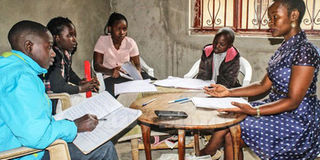Govt sets aside Shs48b for home-learning aids

A primary school teacher (right) conducts a lesson in Kagote Village, Fort Portal City, on July 7 last year. PHOTO/FILE
What you need to know:
- Government also plans to reach out to the learners through local radio stations.
The State Minister for Higher Education, Dr John Chrysostom Muyingo, yesterday told Parliament that the government has earmarked up to Shs48.5b to facilitate the procurement, printing and distribution of study materials for learners in primary and secondary schools.
The home study materials, Dr Muyingo said, are “for Primary One to Primary Four, Senior Five and Senior Six learners who have not been provided for earlier.”
This comes a day after President Museveni cleared tertiary institutions to reopen on November 1 while keeping primary and secondary schools closed.
The reopening of tertiary institutions is, however, pegged on all teachers, non-teaching staff and learners being vaccinated.
President Museveni said primary and secondary schools will reopen once 4.8m people are jabbed. He also noted that “the problem [with primary and secondary schools] is that majority of learners are day scholars” and could pass the virus to at-risk people.
Only 1.7m people in Uganda have been vaccinated thus far. While the country has 5.1 million doses of vaccines at its disposal and is expecting more, vaccine hesitancy seems to be holding steady. Nearly 67,000 doses are closing in on their sell-by date because of low uptake.
The Education ministry is also planning to vaccinate about 357,500 of 550,000 teachers on the government’s payroll to allow for safe reopening schools.
Only 269,945 of these have received the first jab while 96,653 are fully vaccinated. This leaves a total of 280,055 not yet vaccinated at all.
Dr Dennis Mugimba, the Education ministry spokesperson, told journalists at a separate event in Kampala yesterday that they will start distributing the materials in October to ensure continuity of learning.
“We shall avail list of districts and schools that received study materials so that leaders and parents can hold the schools accountable. The books are free of charge and parents can pick for their children in schools,” he said.
He added: “Some schools didn’t distribute the materials to the learners. They left the materials in school yet they are supposed to be used by learners at home.”
The government also plans to reach out to the learners through local radio stations. However, Dr Muyingo did not provide details on how the radio programmes will be packaged and disseminated.
The minister also revealed that when tertiary institutions and universities reopen their doors, freshmen will be given priority. “We plan to implement a case by case opening of institutions based on their capacity to observe SOPs. Priority will be given to first-year students to create room for new entrants given that previous focus was on final year students,” Dr Muyingo said.
He added: “The second priority will be given to study programmes that have heavy practical and hands-on content to ensure that there is mass enrolment. Education levels of pre-primary, primary, secondary are ready for safe reopening as soon as possible.”
Dr Mugimba said there will be no promotional exams.
“We are going to have progression of learners. If you have been in P1, you will progress to P2 and if you were in P6 you will progress to P7. Yesterday, the National Curriculum Development Centre held a meeting and they are trying to refine how to have a smooth progression,” he explained.
He added: “One of the interventions that will come up is called remediation classes whereby when these learners report in January, the first eight to 12 weeks will be focused on catching up with the class in which you were as you are prepared to move on to the next. It is not yet finalised.”
The spokesperson said they are also condensing the curriculum to focus on what is vital so as to make it possible to progress from one level to another.
Other plans
The Education ministry is also planning to vaccinate about 357,500 of 550,000 teachers on the government’s payroll to allow for safe reopening schools.




